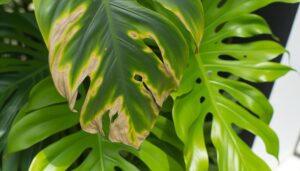Essential Oils for Monstera Deliciosa
Using essential oils for your Monstera Deliciosa can enhance its health and growth. Tea tree oil offers antifungal and antibacterial benefits, directly combating pests.
Neem oil acts as a potent biopesticide, disrupting insect hormone systems. Lavender oil enhances pathogen resistance and stress reduction, providing antifungal and antioxidant effects.
Peppermint oil serves as a strong antimicrobial and insect repellent, disrupting pest nervous systems. For safe application, dilute oils properly, conduct patch tests, and apply during cooler parts of the day to prevent phototoxicity.
Explore the details to reveal the full potential of essential oils for your plant.

Key Takeaways
- Tea tree oil controls pests and pathogens when applied in a diluted solution.
- Neem oil disrupts insect growth and is effective against aphids, spider mites, and powdery mildew.
- Lavender oil enhances resistance to pathogens and reduces plant stress with antimicrobial properties.
- Peppermint oil acts as a natural insect repellent and treats fungal infections.
- Always dilute essential oils and conduct a patch test to prevent plant tissue damage.
Benefits of Essential Oils
Regularly using essential oils can greatly boost the health and strength of your Monstera Deliciosa by providing antimicrobial properties and promoting robust growth. Essential oils contain bioactive compounds that inhibit pathogenic microorganisms.
Studies indicate that oils like eucalyptus and lavender exhibit significant antifungal and antibacterial effects, reducing risks of common plant diseases. Additionally, essential oils can stimulate the plant's metabolic processes, enhancing nutrient uptake and photosynthesis efficiency. This leads to improved growth rates and more vibrant foliage.
When applied correctly, these oils also act as natural insect repellents, minimizing pest infestations without harmful chemicals. By integrating essential oils into your plant care routine, you're leveraging nature's own defenses to secure your Monstera thrives in a healthy, resilient environment.
Tea Tree Oil
Tea Tree Oil offers significant pest control benefits for your Monstera Deliciosa due to its antifungal and antibacterial properties.
To effectively use it, you should apply a diluted solution directly to affected areas using a spray bottle.
However, always exercise caution by conducting a patch test first to guarantee the plant's safety and avoid potential phytotoxicity.
Pest Control Benefits
When combating pests on your Monstera Deliciosa, tea tree oil stands out due to its proven antimicrobial and insecticidal properties. Research confirms that tea tree oil's terpinen-4-ol and alpha-terpineol components effectively target and eliminate common pests like spider mites, aphids, and mealybugs. This natural oil disrupts the pests' respiratory systems, leading to their eventual eradication without harming your plant. Let's explore the key benefits:
| Pest | Effectiveness | Mechanism |
|---|---|---|
| Spider Mites | High | Disruption of respiration |
| Aphids | Moderate | Inhibition of feeding mechanisms |
| Mealybugs | High | Cellular membrane disruption |
| Whiteflies | Moderate | Interference with lifecycle processes |
Understanding these mechanisms allows you to effectively employ tea tree oil in maintaining a healthy Monstera Deliciosa.
Application Methods
To maximize the pest control benefits of tea tree oil for your Monstera Deliciosa, you must apply it correctly and consistently.
First, dilute tea tree oil with water, maintaining a 2% solution to optimize efficacy without harming the plant.
Use a fine mist spray bottle to ensure uniform distribution.
Spray the solution on both sides of the leaves and stem, focusing on areas where pests are visible.
Repeat the application every 7-10 days for sustained control.
- Dilution Ratio: 2% tea tree oil in water
- Application Method: Fine mist spray bottle
- Frequency: Every 7-10 days
- Target Areas: Both sides of leaves and stem
These steps will help you achieve effective pest control while promoting plant health.
Safety Precautions
Given its potent nature, it's important to handle tea tree oil with care to prevent any adverse effects on both your Monstera Deliciosa and yourself.
First, always dilute tea tree oil with water or a carrier oil, maintaining a ratio of 1-2 drops per 100 milliliters. This mitigates phytotoxicity, which can damage your plant's leaves.
Perform a patch test on a small leaf section before full application to confirm no adverse reactions occur. Use personal protective equipment, such as gloves, to avoid skin irritation or allergic reactions.
Ensure proper ventilation during application to prevent respiratory discomfort. By adhering to these precautions, you can safely utilize tea tree oil while maintaining the health of your Monstera Deliciosa.
Neem Oil
Neem oil, an extract from the seeds of the neem tree (Azadirachta indica), serves as a potent biopesticide and fungicide for Monstera deliciosa. It disrupts insect hormone systems, inhibiting growth and reproduction. When you apply neem oil to your Monstera, it effectively combats a range of pests and diseases, including:
- Aphids: Causes feeding deterrence and growth inhibition.
- Spider mites: Interrupts life cycle and reduces population.
- Mealybugs: Induces mortality through ingestion and contact.
- Powdery mildew: Acts as a fungicidal agent.
Scientific studies confirm its efficacy due to compounds like azadirachtin.
Use a diluted mixture (2% neem oil to water) and spray thoroughly on leaves and stems. Repeat every 7-14 days for best outcomes.
Lavender Oil
You'll find that lavender oil offers numerous benefits for Monstera Deliciosa, including its antimicrobial properties that mitigate fungal infections.
Applying lavender oil involves diluting it properly to avoid phytotoxicity, ensuring your plant's safety.
Always conduct a patch test on a small leaf section to prevent adverse reactions.
Benefits for Plant Health
Lavender oil, rich in linalool and linalyl acetate, has been shown to enhance Monstera deliciosa's resistance to pathogens and pests. Scientific studies indicate that these compounds possess antimicrobial and insecticidal properties, which notably deter harmful organisms. By using lavender oil, you can bolster your plant's defenses through natural means.
Consider these benefits:
- Antifungal effects: Lavender oil inhibits the growth of fungi, reducing the risk of diseases like root rot.
- Insect repellent: The oil repels common pests such as spider mites and aphids.
- Stress reduction: It helps lower plant stress, enhancing overall health and growth.
- Antioxidant properties: Lavender oil's antioxidants protect plant cells from oxidative damage.
These multifaceted benefits make lavender oil a valuable ally in maintaining a healthy Monstera deliciosa.
Application Methods Explained
To maximize the benefits of lavender oil for your Monstera deliciosa, it's important to apply it correctly and effectively. Dilute lavender oil to a concentration of 0.5% by mixing 2-3 drops with 500 ml of water. Use a fine mist spray bottle to guarantee even distribution over the foliage. This method enhances absorption through the stomata, optimizing the plant's uptake of therapeutic compounds.
Additionally, you can apply the diluted solution directly to the soil to deter pests and promote root health. Evidence supports that lavender oil's antimicrobial properties help in reducing pathogenic bacteria and fungi. Make certain the application is done during early morning or late afternoon to prevent phytotoxicity due to sun exposure.
Safety and Precautions
When using lavender oil on your Monstera deliciosa, it's important to take into account potential risks and implement appropriate safety measures. Lavender oil, while generally safe, can still pose risks if misapplied.
To ensure peak plant health, consider the following precautions:
- Dilution: Always dilute the lavender oil with water at a ratio of 1-2 drops per cup to prevent phytotoxicity.
- Spot Testing: Conduct a patch test on a small leaf area to observe any adverse reactions before full application.
- Frequency: Limit applications to once every two weeks to avoid potential buildup and toxicity.
- Ventilation: Guarantee the plant is in a well-ventilated area to prevent oil accumulation on foliage.
These steps will help safeguard your Monstera deliciosa from potential harm.
Peppermint Oil
Peppermint oil, known for its potent antimicrobial properties, can be an effective solution for treating common pests and fungal infections in Monstera Deliciosa.
This essential oil contains menthol, which disrupts the nervous systems of pests such as aphids and spider mites, leading to their eradication.
Additionally, peppermint oil exhibits antifungal activity, inhibiting the growth of pathogens like powdery mildew and root rot. Studies highlight its efficacy in reducing microbial load, thereby protecting your plant's health.
When you use peppermint oil, its volatile compounds create an inhospitable environment for pests and fungi, minimizing the risk of infestations.
It's important to remember that consistent application and proper dilution are key to leveraging peppermint oil's benefits without harming your Monstera.
How to Apply
Applying peppermint oil to your Monstera Deliciosa involves creating a properly diluted solution to guarantee its effectiveness and safety. Begin by mixing 10-15 drops of peppermint oil with one liter of water in a spray bottle. Ensuring uniform distribution is crucial, so shake the bottle vigorously before application.
Apply the solution by lightly misting the leaves, focusing on the undersides where pests often congregate. Perform this application in the early morning or late afternoon to minimize potential phototoxicity.
- Use distilled water to avoid mineral buildup.
- Test on a small leaf section first to check for adverse reactions.
- Repeat application every two weeks for best results.
- Monitor for signs of improvement or potential phytotoxicity.
Your Monstera will benefit from this precise and evidence-based approach.
Safety Tips
To safeguard the safe use of essential oils on your Monstera Deliciosa, always dilute the oil properly to prevent damage to the plant tissues. Essential oils are potent and can cause phytotoxicity if not used correctly. A typical dilution ratio is 1-2 drops of essential oil per 100 ml of water. Conduct a patch test by applying a small amount to one leaf and observe for 24 hours for any adverse reactions.
| Essential Oil | Recommended Dilution | Observation Period |
|---|---|---|
| Tea Tree | 1 drop/100 ml water | 24 hours |
| Peppermint | 2 drops/100 ml water | 24 hours |
| Lavender | 1 drop/100 ml water | 24 hours |
Ensure good ventilation during application to avoid volatile compound accumulation. Follow these guidelines for best plant health.
Conclusion
Incorporating necessary oils into your Monstera deliciosa care routine is like giving your plant a custom suit of armor. Tea tree, neem, lavender, and peppermint oils offer different benefits, from pest control to overall plant health.
When applied correctly, these oils can greatly enhance your Monstera's strength. Always follow safety guidelines to make sure you're providing the best care.
Embrace this holistic approach, and watch your Monstera thrive like never before.






